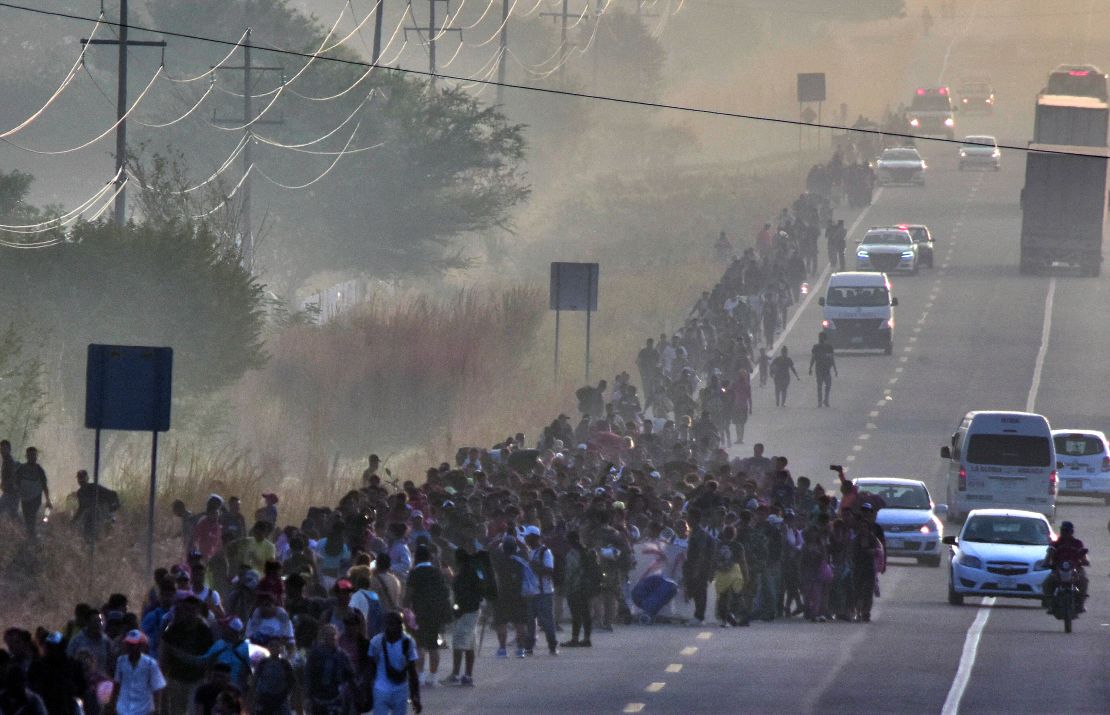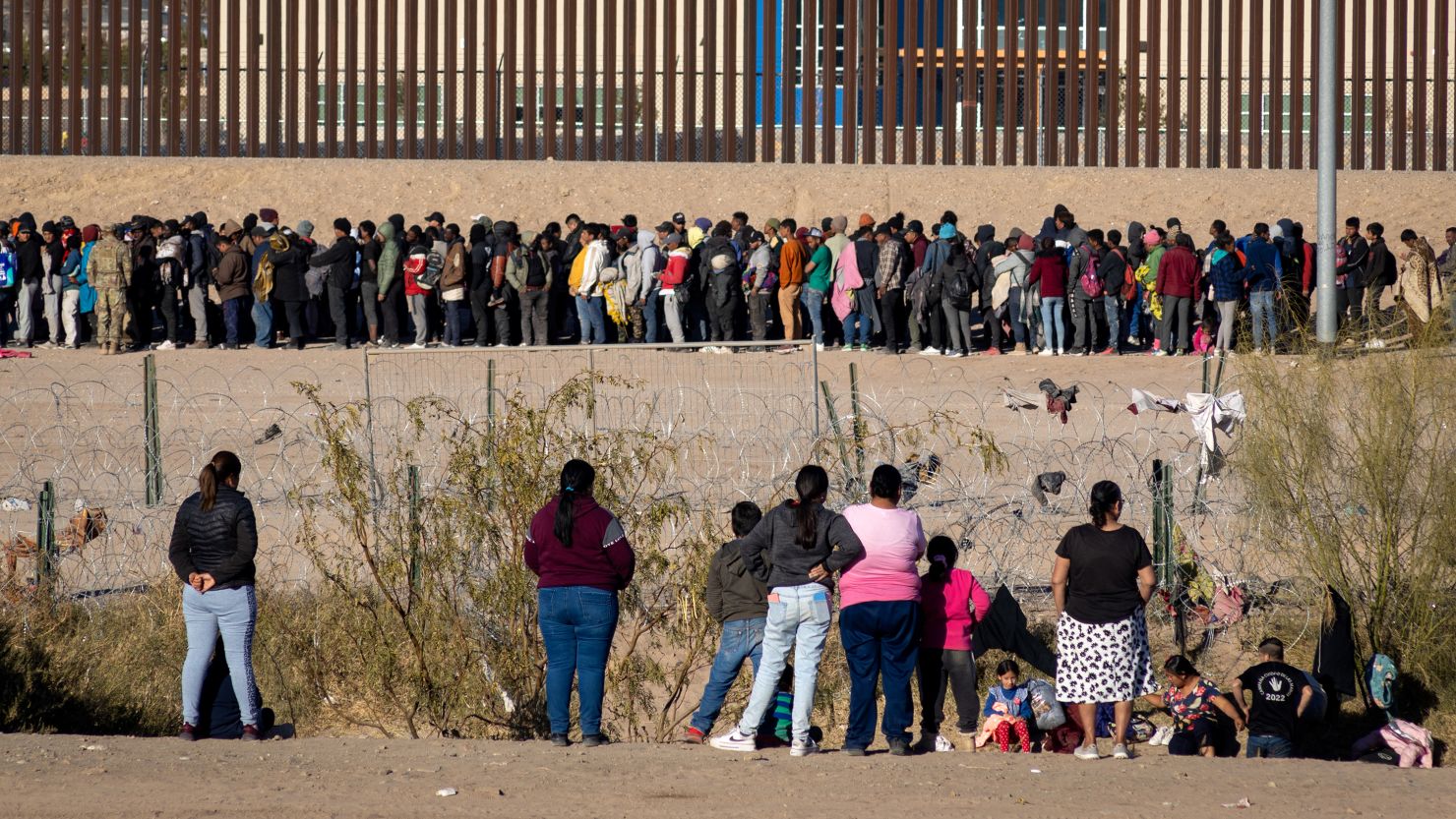President Joe Biden is embracing tougher border measures, including shutting down the US-Mexico border, marking a stark shift from his early days in office as he tries to fend off former President Donald Trump’s attacks on immigration policy ahead of the election.
Hours after House Speaker Mike Johnson warned on Friday that the emerging border deal in the Senate is “dead on arrival,” Biden offered this message to House Republicans: “Securing the border through these negotiations is a win for America. For everyone who is demanding tougher border control, this is the way to do it. If you’re serious about the border crisis, pass a bipartisan bill and I will sign it.”
Biden took office pledging to restore asylum and manage the border in a “humane” way. But his administration has faced the harsh realities and challenges at the US-Mexico border amid record migration across the Western Hemisphere — making it a political vulnerability seized on by Republicans.
In recent weeks, Trump has lobbied Republicans to oppose the border compromise being delicately hashed out in the Senate because he wants to campaign on the issue this November.
Over the course of his administration, Biden has leaned on more restrictive measures to try to stem the flow of migration, but Friday’s statement revealed a tougher stance as the president tries to control an issue that’s dogged him, while risking putting him at odds with some allies.
“(The compromise) would give me, as President, a new emergency authority to shut down the border when it becomes overwhelmed. And if given that authority, I would use it the day I sign the bill into law,” Biden’s statement said.
Biden’s embrace of an authority that would allow him to shut down the border in the event of a migrant surge was striking to current and former administration officials, as well as to immigrant advocates.
Johnson on Saturday attacked Biden over his endorsement of the potential border deal, arguing the president can take executive action without Congress to clamp down on migrant crossings.
And in his first statement on the Senate deal, Johnson claimed that it would force the US to surrender to illegal migration. “According to reports, the Senate’s pending proposal would expressly allow as many as 150,000 illegal crossings each month (1.8 million per year) before any new ‘shutdown’ authority could be used. At that point, America will have already been surrendered,” Johnson said in the statement.
A source familiar with the Senate deal, however, said Johnson is providing a false interpretation of the proposal. The source said that once border crossings reach a level requiring the Department of Homeland Security to take emergency measures, federal authorities would be required to significantly restrict illegal border crossings until the US sees fewer than 2,000 migrants approach the border per day over a two-week span.
Under the soon-to-be-released package, the Department of Homeland Security would be granted new emergency authority to shut down the border if daily average migrants crossing unlawfully reach 4,000 over a one-week span. Certain migrants would be allowed to stay if they proved to be fleeing torture or persecution in their countries.
The details remain unclear. But the authority is reminiscent of a Covid-era border restriction invoked by Trump in 2020 that allowed authorities to turn migrants away at the border. It resulted in more repeat border crossers and still placed a strain on the immigration system.
Current and former Homeland Security officials have raised alarm over the deal, casting doubt over the effectiveness of the authority to shut down the border.
It’s impossible to close the border to asylum seekers because of current law, despite multiple attempts by Trump to do so while he was in office.
One former Biden official said Biden’s Friday statement “made sense politically to put down a marker now that Johnson said no.”
Officials are concerned that the new emergency authority would come with the same headaches that accompanied Title 42, a Covid-era restriction.
Title 42, a public health authority invoked by Trump during the pandemic, allowed authorities to turn migrants encountered at the US-Mexico border back to Mexico or their origin country.
But authorities still contended with a high number of border crossings, and thousands of people gathered in northern Mexico waiting to cross.
While Title 42 was in place, officials also grappled with a jump in repeat crossers because there was little in the way of legal consequences or buy-in from Mexico, where thousands of migrants were pushed back.
Immigrant advocates quickly slammed Biden over his statement — revealing the deepening rift between the president and the advocacy community.
For weeks, immigrant advocates and progressives fretted about the parameters of a border deal that includes punitive measures for migrants crossing the US-Mexico border, including those seeking asylum, and raised alarm over White House concessions in the ongoing talks.

Robyn Barnard, senior director of refugee advocacy for Human Rights First, called the situation disappointing.
“This president is laying bare his callous disregard for and willingness to play politics with the lives of Black and brown migrants, many of whom come to our Southern border in order to exercise their legal right to seek asylum,” Barnard said.
“If he listened to any of the immigration experts in his administration, he would know that these proposals — shutting down the border, expelling migrants, making it harder to access asylum protection — are not ‘fair’ and will not ‘secure the border,’ they will however cause chaos and human suffering,” she added.
Kerri Talbot, executive director at Immigration Hub, decried the politicization of the border.
“I hope that the leaders of both parties can step back and think through real solutions that would lead to a controlled border,” she told CNN. “Shutting down the border has never been possible. What is possible is a well-resourced secure and humane border if Congress would pass the necessary funds.”
Earlier in the week, Democratic Sen. Alex Padilla of California warned of progressive backlash against the administration over the potential immigration deal.
“There’s the substance and there’s the process. The frustration about the process is, frankly, the lack of transparency. It’s been months now and there’s still no language, no text floating around to be able to review and say, ‘I agree with this’ or ‘I don’t agree with that,’” Padilla told CNN’s Manu Raju.
“Returning to Trump’s playbook, you know, Trump’s greatest hits when it comes to border security is not the answer to the problem.”
This story has been updated with new reporting.
CNN’s Manu Raju contributed to this report.




